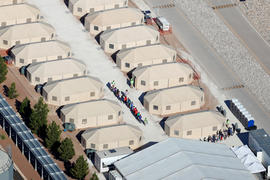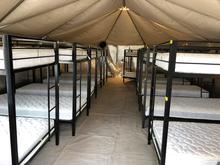A loophole in federal policy allows the “Tent City” at the Tornillo Port of Entry in Texas and a massive shelter in Homestead, Florida to escape the rigorous, often unannounced child welfare inspections that nearly all other similar shelters are subjected to.
The U.S. Department of Health and Human Services (HHS) operates more than 100 shelters for unaccompanied migrant children across 17 states. All but two — Tornillo and Homestead, housing more than 1,350 children combined — must comply with state regulations that govern nearly every aspect of a child’s stay.
Tornillo and Homestead are located on federal land, where state officials have no authority.

Immigrant children housed in tents near the Mexican border in Tornillo, Texas, are seen in this June 18, 2018 photo.
MIKE BLAKE / REUTERS
Paul Zimmerman, a spokesperson for the Texas Department of Family and Protective Services, describes the state inspections as rigorous. “There are thousands of minimum standards and regulations, but when an inspector goes out to a facility they’ll look at record keeping, whether it’s secure, child-to-caregiver ratio,” said Zimmerman, whose agency was responsible for inspections at all child care facilities in Texas until September 2017 when Texas legislation shifted its responsibilities.
The Texas agency now in charge of state inspections, the Texas Health and Human Services Commission, confirmed that it does not oversee the Tornillo facility.
The Tornillo facility is managed by the nonprofit BCFS. A representative of the nonprofit acknowledged it isn’t subject to frequent state child welfare inspections, but said the organization is required to follow guidelines mandated by the “Flores settlement,” stemming from the Supreme Court case Flores v. Reno.
That settlement set rules for the treatment of immigrant minors in federal custody — including mandating that shelters meet state standards, but there is currently no mechanism to enforce those standards.
In response to questions about its shelters on federal land, HHS said the Tornillo and Homestead facilities are expected to follow regulations laid out in the Office of Refugee Resettlement policy manual, which includes an extensive array of standards governing health care, case work, abuse prevention and child welfare.
“As you can see in our policy guide there are very high standards for children in our care,” wrote Kenneth Wolfe, a spokesperson for HHS’ Administration for Children and Families, which oversees ORR, in an email to CBS News.
The manual states care providers must abide by all state laws and regulations governing child care and child welfare. However, the manual was published in 2015, when all ORR immigrant minor shelter facilities were on state land.

A dormitory inside a tent in a federal temporary shelter for unaccompanied minors who crossed the border from Mexico to Tornillo, Texas.
Administration for Children and Families/U.S. Health and Human Services
New child care facilities on state land in both Texas and Florida are subject to multiple, often unannounced child welfare inspections per year, according to state guidelines. But the Tornillo and Homestead facilities can expect just one such examination, “every two years,” according to the manual.
The only frequent review mandated by ORR policy is done by third-party contractors, which are not focused on child welfare.
These contractors are instead focused on providing support services for case workers, and not recommendations related to safety and healthcare, according to a spokesperson for General Dynamics Information Technology, which employs many of the contractors.
Texas inspection records indicate the more frequent surprise reviews conducted by state officials can catch major safety and health breaches, even at facilities with otherwise successful child welfare records.
In the days after public outcry about family separation brought attention to a new facility in a former Walmart, where as many as 1,500 boys were being housed, Southwest Key, the organization that operates the facility, proudly touted its inspection record. The organization said its facilities had been evaluated for compliance on more than 70,000 standards in the past three years, and only been found deficient in fewer than 1 percent.
But inspectors visiting Southwest Key facilities in the past two years caught dozens of violations, including an employee who worked four months without being fingerprinted, failures in medical recordkeeping, an instance in which a child who tested positive for a sexually transmitted disease wasn’t given treatment for 18 days, and neglecting to lock up medicines and cleaning supplies.
Wolfe said the facilities at Tornillo and Homestead are not subjected to state oversight, not only because of their federal locations, but because they are planned as temporary facilities.
BCFS has a contract to operate Tornillo until July 13. It is not clear if that contract will be extended. Asked if there is a date set for either facility to close, Wolfe said only that HHS “will make determinations about opening and closing unaccompanied alien children program shelters based on the number of beds needed to provide appropriate care for minors in the program.”
Homestead previously housed unaccompanied minors from June 2016 to April 1, 2017.
HHS did not respond when asked when both facilities are expected to close, but it’s unlikely Tornillo and Homestead will be the last temporary facilities on federal land. The Pentagon confirmed to CBS News on June 21 that HHS officials had recently visited four Army and Air Force bases in Texas and Arkansas while researching new locations to house 20,000 unaccompanied migrant children. The bases are federal property and shelter facilities on them would not be subject to state child welfare inspections.
